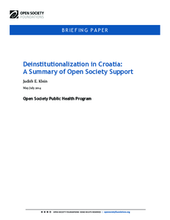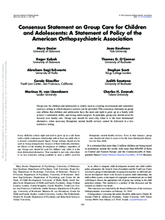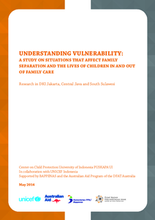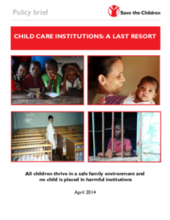Displaying 531 - 540 of 771
This paper examines the work Open Society Foundations have done in Croatia as part of its Mental Health Initiative (MHI), with the goal of helping people with disabilities return to their communities where they are support
This statement of policy of by American Orthopsychiatric Association reviews the evidence on the use of congregate or group care for children and adolescents and concludes that institutional care is nonoptimal for children of all ages, including teenagers, and that even smaller group care settings can be detrimental to the growth and well-being of youth.
This report presents analysis and key findings from a study aimed at fully understanding the situations of children in Indonesia that may lead to family separation.
Save the Children has released a policy brief outlining its position on the institutional care of children.
This video from Learningservice.info discusses issues around orphanage volunteering and tourism. The video is accompanied by a number of prompts for further discussion.
Physical victimization by peers was examined among 1,324 Jewish and Arab adolescents, aged 11 to 19, residing in 32 residential care settings (RCS) for children at-risk in Israel.
This paper presents the findings of a survey of Russian care leavers. The emphasis is on care leavers' experiences of the Russian institutional care system, and the issues that impacted on their postcare transition to adulthood.
This article reviews a new book by Charles A. Nelson, Nathan A. Fox and Charles H. Zeanah who conducted seminal studies in Romania on children who were institutionalised, comparing their developmental and well-being outcomes to children who were placed in foster care or adoptive families.
Infant Mental Health Journal has published an important Special Issue on Global Research, Practice, and Policy Issues in the Care of Infants and Young Children at Risk. This article describes the adverse mental health effects of violence and abuse in an institution in Tanzania.
Infant Mental Health Journal has published an important Special Issue on Global Research, Practice, and Policy Issues in the Care of Infants and Young Children at Risk. This article reports on a quasi-experimental study commissioned by the Chilean government that had two general aims: (a) to assess infants’ psychoaffective developmental levels and (b) to evaluate whether an intervention based on the promotion of socioemotional development modifies the infant's psychoaffective development.




